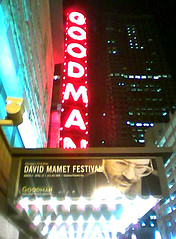It’s fashionable to knock David Mamet, but I’m not gonna do it.
Mostly because the show I saw last night at the Goodman – A Life in Theatre – doesn’t give me much ammunition. But also because I like his plays for the way they map out human relationships and transformations – and because they give me a window into a world that fascinates me: the World of the Guy.
Last night’s show – a one-act from the mid-70s that’s running as part of the Goodman Theatre’s Mamet Festival – lacked the hyper-staccato dialog that punctuates his works like Glengarry Glen Ross and Oleanna. There was plenty of parlay back and forth, but it was quite fluid and, as always with Mamet, a single phrase delivered just so can really pack a wallop.
So about this guy thing. Not being one, I have rare opportunities to observe it in action. Being a girl I skew results as soon as I enter the room – that too, fascinates me about the World of the Guy – that a whole clutch of them might change their behavior in response to one of us – in response to the awareness that a woman is present (a change that some guys negotiate better than others). But that’s not what this post is about.
It’s about power, and how men wrestle for the reins. (Women do it too, but I would argue that we use different strategies.)
Mamet cross-sections into that world – one example of it, anyway – so that I, as observer and audience, can watch the boys be boys. (Come to find out: Girls like to watch too.) And while it might be impolitic to say it: Virility, and the powerplay of virility, is thrilling to watch.
The play is concerned with two actors: an older gentleman whose career is waning; a younger one whose career is taking off.
By the time the play is done we see them run through all the stages of relationship – from the young man’s awe at the elder thespian’s prowess, to his growing success as an actor as he comes into his own power; and we see the older man at first strong and then fading, forgetting lines, decaying with time, with age. We see them respond to one another: first there is deference on the younger man’s part, some condescending on the elder’s; it evolves through a pissing match and finally, inevitably, mythically, we witness the transfer of power.
As with so many of Mamet’s plays there’s a hint of homoeroticsm, and here it’s the moment when the younger (we learn later that he’s straight) cleans a dab of makeup from the elder’s neck after a show, before they head out for the evening they’ve agreed to share. But even here Mamet’s working the guy thing: We suspect that the elder man sees an opportunity in this sweet young thing -- but we learn later that the younger man saw his opportunity too in this same moment of sweetness – and that he’ll use it, and what it foreshadows, to come out on top at the end.
Of course, it’s not all the younger guy’s doing: Age undoes us all, and it works its way here too. A case could be made that these two characters are two views on the same individual – the younger man will get to the older man’s chair soon enough, and the next young Turk will move up in the ranks. But I won’t go there, because I’ve already taken up enough of your time.
So to all the folks who contend that Mamet does something a little too fierce and hyper-masculine on his stage – that he should rein in the yang and bring in some yin -- I say shoulds are for sermons, and thanks, but I’ll hang out with Wendy Wasserstein when I’m looking for girl talk (which I need in just as steady a supply, thank you very much).
But when I need me some yang, I’ll go look up David, ‘cause he knows how to bring it home.
Sunday, March 19, 2006
Subscribe to:
Post Comments (Atom)







No comments:
Post a Comment